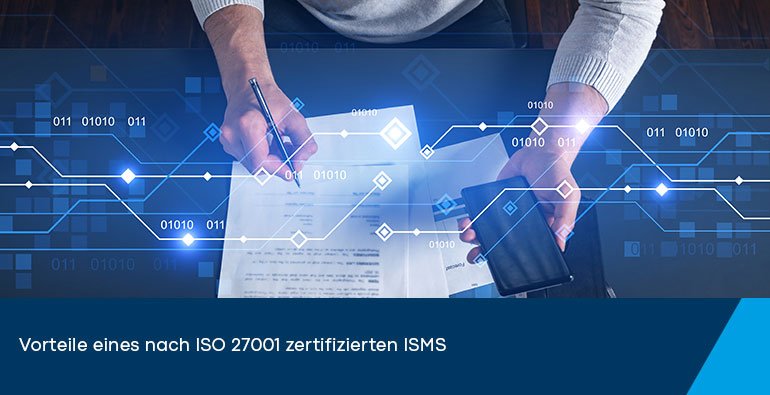Benefits of an ISMS in the context of an ISO 27001 certification

In order to achieve ISO 27001 certification, a company must have a functioning Information Security Management System (ISMS). For some business sectors (e.g., in the area of critical infrastructures—KRITIS), compliance with certain ISO/IEC standards is mandatory. The benefits of an ISMS are versatile, but at its core is one thing: increased information security.
What is an ISMS?
ISMS stands for Information Security Management System. The word ‘system’ does not mean software here, but its implementation can be supported by such software. The term refers to guidelines and methods with which the information security of an organization is established, controlled and continuously improved.
The most important protection goals of an ISMS are confidentiality, integrity and availability. The aim is therefore to protect data from theft, hacks, viruses and manipulation, and to always make it accessible to authorized persons. This is done as a uniform concept across all departments; however, stricter regulations may apply to certain business areas than to others. An ISMS therefore brings a structured approach to (IT) security, including the identification and proactive avoidance of risks and vulnerabilities, as well as to the definition of measures in the event of information security incidents.
What is ISO 27001 certification, and how does it work?
The international standard ISO/IEC 27001 specifies the requirements for an ISMS. The ISO standards themselves are updated every few years as technical possibilities evolve and, along with them, the requirements for the ISMS in use. ISO standards are based on best practices and always consider the context of the organization.
For certification, an external auditor checks whether your organization actually complies with the requirements described in the standard. Your ISMS must be regularly adapted to the processes and procedures in practice; the systems and protective mechanisms used must also correspond to the so-called “state of the art”, i.e., meet the current technical requirements. Your ISMS benefits from continuous development and improvement between initial certification, surveillance audits and recertification.
Benefits of an ISMS according to ISO 27001 standard
The following 6 benefits of an ISMS show how an Information Security Management System pays off for a company:
1. benefit of an ISMS: digital inventory
An ISMS requires a recording of the status quo as well as a gap analysis (where goals are not yet achieved). In a sense, you are forced by an ISMS audit to create a descriptive digital image of your core processes. Business processes, assets and vulnerabilities are systematically documented. This documentation is now located “in one place” and is used to plan and implement measures specifically so that any gaps found can be counteracted.
2. benefit of an ISMS: risk management
Those who have prepared and conducted an audit can proactively minimize hazards. For it allows you to implement exactly the right safety measures and clarify responsibilities. If you have an external auditing agency look at your handling of risks before the actual certification, further blind spots within your risk management will be identified. Controlled risk minimization can also have a positive impact on your insurance policies.
3. benefit of an ISMS: protection of intellectual property
It’s not just about personal or financial data. Product data, codes, trade secrets and ideas can also be attacked or stolen. Increased information security protects these contents equally, and thus ensures the continued existence of your company in the worst case.
4. benefit of an ISMS: image improvement and competitive advantages
High quality and security standards are magnets for customers, cooperations and investors. It may already help to tell your stakeholders that you are working with an ISMS. However, an ISO 27001 certification significantly strengthens the effect. Use this to your competitive advantage! In more and more tenders—especially in the public sector—a certified Information Security Management System according to ISO 27001 is already mandatory.
5. benefit of an ISMS: support for GDPR compliance
Note: The international standard ISO/IEC 27001 does not contain the same requirements as the General Data Protection Regulation. But those who work towards an ISO 27001 certificate take an important step towards GDPR compliance. This is because structured handling of information (including sensitive data covered by the GDPR) becomes demonstrable with an ISMS.
6. and most important benefit of an ISMS: increase of the security level
As a final point, we would like to mention the most important one: Security measures systematically reduce the risk of cyberattacks, application errors and data misuse. All types of information are protected more effectively. This strengthens your entire institution.
Software support for a functioning ISMS
Even for medium-sized enterprises, software can be worthwhile. Flexibly configurable applications are ideal. A GRC tool (Governance, Risk and Compliance) such as the OMNITRACKER GRC Center helps you to implement a functioning ISMS that also withstands the audits for certification. Thanks to the multi-standard solution, this is not limited to ISO/IEC 27001, but can be extended to include any standard.
The OMNITRACKER GRC Center helps, among other things, to document and manage internal and external requirements and to monitor their compliance. Deviations are highlighted. Possible damages are assessed thanks to the integrated risk management and countermeasures are initiated. Audit logs are also created automatically by the software, which optimizes the audit process and simplifies the achievement of compliance. This, again, allows you to prepare for certification in the best possible way and impresses potential and existing customers.